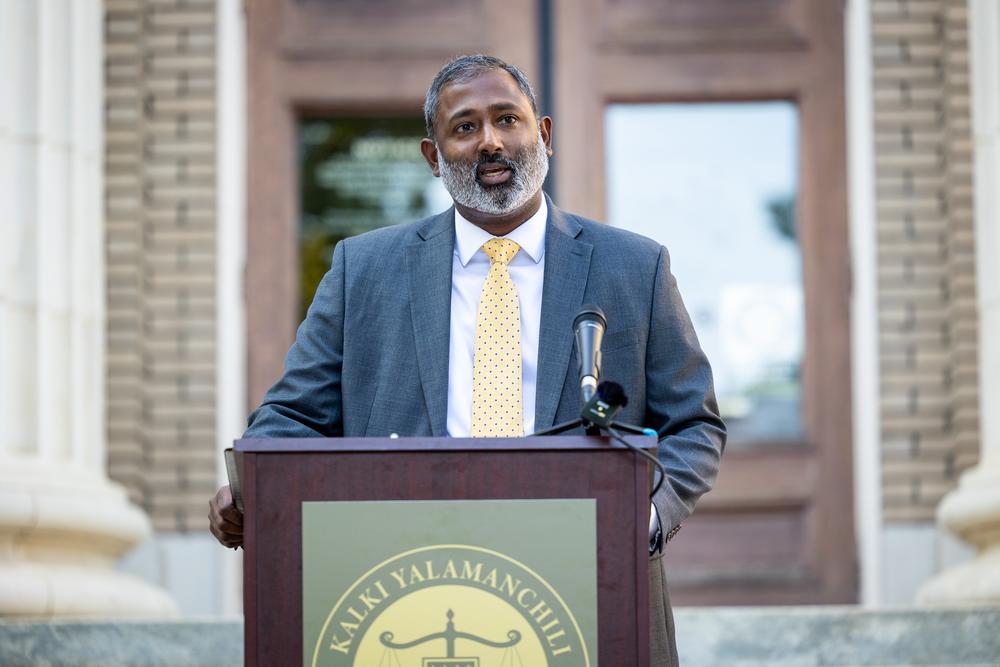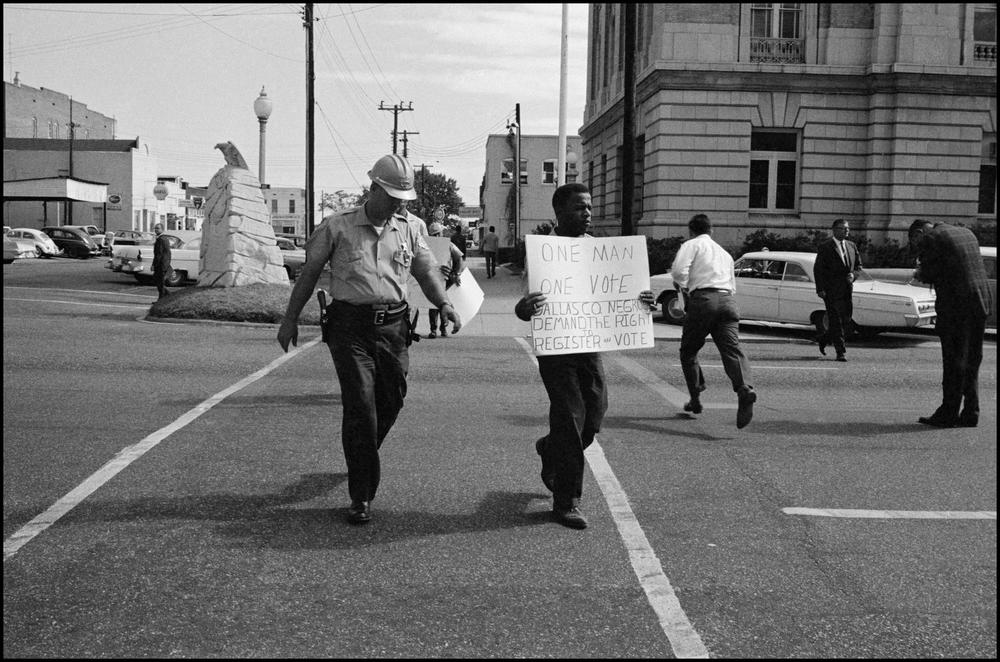
Section Branding
Header Content
Georgia Today: Democrats recalibrate; Lawmakers reassess disaster plans; John Lewis biography author
Primary Content
LISTEN: On the Friday, Nov. 8 edition of Georgia Today: Georgia democrats look to recalibrate after Tuesday night's election; state lawmakers reconsider how to plan for natural disasters. and a new biography profiles the life and legacy of civil rights hero John Lewis.

Peter Biello: Welcome to the Georgia Today podcast from GPB News. Today is Friday, Nov. 8. I'm Peter Biello. On today's episode, Georgia Democrats look to recalibrate after Tuesday night's Election. State lawmakers reconsider how to plan for natural disasters. And a new biography profiles the life and legacy of civil rights hero John Lewis. These stories and more are coming up on this edition of Georgia Today.
Story 1:
Peter Biello: Georgia Democrats are looking to recalibrate after Tuesday's election. So far, results show Democrats didn't narrow GOP majorities in the state legislature as much as they'd hoped. Democrats will gain two seats in the state House, while the party makeup will stay the same in the state Senate. One of the Republican-Democratic flips will make 23-year-old Bryce Berry the youngest-ever member of the State House.
Bryce Berry: We had a message. Didn't work out. Now it's time to go back. It's time to get our heels in the ground and fight harder and take our message even better so that voters can accept it in 2026 and 2028.
Peter Biello: Bryce will represent a district in Atlanta. How does he see the Democrats recalibrating?
Bryce Berry: We have to be investing in things like coalition organizing and youth organizing year-round, so we're not only showing up election years asking for their vote, but we're showing up and asking people, are they — are they okay?
Peter Biello: Democrats will pick new minority leaders in both chambers after their current leaders announced their retirements earlier this year.
Story 2:
Peter Biello: Georgia state Senate Republicans nominated Senator John Kennedy of Macon last night for president pro tem, a vote that signals they'll likely stick with their same leadership team for the next two years. The full Senate will vote on the post when it convenes for a new term in January. With Republicans retaining the same 33 to 23 majority as the last term, Kennedy is likely to win that vote. After the vote, Kennedy reaffirmed that the Senate Republican caucus will maintain close links with Lt. Gov. Bert Jones, a fellow Republican and former state senator. Kennedy says he wants to see continued tax relief and a solution to chronic absenteeism in schools, a problem that has lingered since the COVID-19 pandemic.

Story 3:
Peter Biello: After winning a decisive victory in the race for district attorney in Georgia's Western district, independent Kalki Yalamanchili is preparing to take office on Jan. 1. Yalamanchili defeated Democrat Deborah Gonzales with nearly 60% of the vote. The district covers Clark and Oconee counties. Yalamanchili ran on the message of removing partisanship from the DA's office and hiring enough prosecutors to handle the caseload. He says he's working on hiring more prosecutors now.
Kalki Yalamanchili: Our plan is to fully staffed that office with experienced prosecutors. And then, you know, to the extent we have newer, younger prosecutors, they will then have mentors and more experienced attorneys that can train them on how to do the job.
Peter Biello: Gonzales had faced legal reprimands for not communicating with victims about cases and was sued for violating open records laws —criticism she called distractions from her office's accomplishments, which included expunging people's records, resentencing five people and referring 15 juveniles to restorative justice programs.
Story 4:
Peter Biello: Rudy Giuliani says he is the victim of a political vendetta and believes the judgment against him in favor of two Georgia election workers could be reversed. The former lawyer for President-elect Trump has been ordered to turn over assets, including a car and a watch as part of a $148 million defamation judgment. The courts say the assets are due to two Georgia election workers, Ruby Freeman and Shae Moss, whom Giuliani defamed by spreading lies about their involvement in election fraud. Giuliani's lawyers have so far argued unsuccessfully that Giuliani should not be forced to turn over his belongings while he appeals the judgment. Giuliani also maintains that he did not defame the election workers, who say they face death threats after Giuliani accused them of counting ballots multiple times and tampering with voting machines. Asked whether he might join the incoming Trump administration, Giuliani says he would, if that's what Trump wants.
Story 5:
Peter Biello: State lawmakers have been tasked with considering how Georgia should move forward on planning for natural disasters. The Senate Subcommittee on Disaster Mitigation and Resilience held its first meeting earlier this week in an Atlanta suburb after being postponed by Hurricane Helene. GPB's Sofi Gratas has more.
Sofi Gratas: Georgia's current response to natural disasters is spread across a variety of players, like emergency management and natural resource agencies. Now, lawmakers are considering a different option, creating and funding a statewide response team or outsourcing that work to private companies. It's something other states have done with success, says UGA professor Brian Bledsoe. And as floods and extreme temperatures become more common in the South, Bledsoe told lawmakers random acts of kindness will not be enough.
Brian Bledsoe: And a lot of people talk about, well, we need capacity. It's a lot of things. It's people that can write grants. It's staff embedded across sectors. And there's some state level guiding vision for resilience.
Sofi Gratas: It will be up to elected officials to approve that vision in order to help prepare for disasters before they happen. For GPB News, I'm Sofi Gratas.

Story 6:
Peter Biello: MARTA is planning a groundbreaking next week for a project expected to generate 700 construction jobs and 400 permanent jobs. The Clayton County Operations and Multipurpose Facility will support both diesel and battery electric buses for the county's expanding transit system. MARTA secured $33 million in federal funding for this project through the Federal Transit Administration, as well as a $5 million earmark obtained by Sen. Raphael Warnock. And it's also directed $5.6 million in FTA formula grants to support the project.
Story 7:
Peter Biello: Retailer American Freight is closing all of its 328 stores, including 15 in Georgia. The closures come as the result of a Chapter 11 bankruptcy plan. Parent company Franchise Group said American Freight had struggled due to sustained inflation and macroeconomic challenges facing the large durable goods sector. During the store-closing sales, select American freight financing and delivery services will remain available to customers.
Story 8:
Peter Biello: Sea turtles in Coastal Georgia had a slow nesting season this year, but experts say a busy season is on the horizon. GPB's Benjamin Payne reports.
Benjamin Payne: About 2,500 loggerhead nests were recorded along Georgia's beaches throughout the season, which runs from May through October. That's about 1,000 fewer than last year. The drop was expected, though, because sea turtle nesting tends to come in predictable waves. Biologist Mark Dodd is with the Georgia Department of Natural Resources and oversees the state's sea turtle conservation program.
Mark Dodd: The good news is that the overall trend in nesting over the last 36 years is that population is increasing at about 4% annually. It indicates that we're in a recovery period for loggerheads.
Benjamin Payne: Dodd attributes the long-term success of the species to conservation measures begun in the '70s and '80s. He says next year's likely to bring a busy nesting season similar to 2022, when Georgia saw about 4,000 sea turtle nests. For GPB News, I'm Benjamin Payne in Savannah.

Story 9:
Peter Biello: Georgia's very own John Lewis rose from abject poverty to become what many called the conscience of the civil rights movement in Congress. The new biography tells his story and what the Atlanta Journal-Constitution calls a, quote, "danger filled coming-of-age adventure" chronicled in sweeping detail by David Greenberger. He teaches history and journalism at Rutgers University and wrote John Lewis: A Life, released last month. He spoke to GPB's Orlando Montoya.
Orlando Montoya: David Greenberg, How did Lewis rise through the civil rights movement to become a leader?
David Greenberg: It's really a remarkable story how John Lewis emerges as a leader in the movement, because in so many ways he wasn't the type you would necessarily mark for leadership. Yeah, he came from a rural Alabama background. He spoke with a thick, rural accent and a bit of a stammer. When he got to the American Baptist Theological Seminary in Nashville, not — itself not a particularly big place, even there, he seemed kind of a bit of an outsider: pure hick, his friend Bernard Lafayette said. And he was shy. He lacked a certain amount of self-confidence. And yet, within a short time, certain natural leadership qualities emerged in him. He was thoughtful. He was attentive to others. And maybe above all, he was deeply and wholly committed to the ideals of Gandhian and Martin Luther King-style nonviolence that became the movement's philosophy.
Orlando Montoya: How did Lewis handle moments of despair and vulnerability, such as when he was ousted as leader of the Student Nonviolent Coordinating Committee, which was around the same time that Martin Luther King Jr. And Robert F. Kennedy were assassinated?
David Greenberg: It's a low moment for him. The civil rights movement and in particular SNCC, the organization he led, has moved away from the ideals of nonviolence and interracial cooperation toward a more Black separatist philosophy. Lewis leaves Atlanta, spends a sort of unhappy year in New York City. One person who makes a big difference in his life at this point is Lillian Miles. Lillian was a woman he had just started dating and she visits him. He's actually in the hospital for exhaustion, maybe even depression. And Lillian sort of comes along and gives him love and attention and helps him sort of believe in himself again. And at that point, they decide to get married. And for the rest of his life — and I think this is not fully appreciated; I think it's something my book tries to make clear and shed light on — Lillian really becomes a big source of ambition, inspiration and support for him as he goes on to pursue what turns out to be a very successful career in politics.
Orlando Montoya: Lewis was called the conscience of the Congress, but he was elected to Congress and displayed some of the opportunism and politics that that institution is known for. Can you talk about those chapters in the book and why you felt they're important in understanding Lewis?
David Greenberg: Well, I think John Lewis, you know, had two very important parts of his life, and I sort of call them "Book 1: Protest" and "Book 2: Politics." Now, sometimes politics does require people to be opportunistic, to place winning ahead of maybe a purely principled stand. But I don't see that at all as a negative quality in John Lewis. I think he did stick to his principles. His title of "the conscience of Congress" was very much deserved, and yet nobody gets anywhere simply by, you know, articulating the same principles over and over. You also have to work to make change, and that's why people elect you. So he learned to be a good congressman and sort of bring home the bacon for his district, helping Atlanta with airport funding and highway funding that helped make it the big, dynamic, entrepreneurial city that it was becoming. In his race against his friend Julian Bond, really his best friend, he understood that sometimes you have to go negative in politics. And he decided that after some reluctance to use the issue of Julian Bond's cocaine use as an issue in that campaign, even though it was unpleasant to raise.
Orlando Montoya: Well you had a living subject to work with until 2020. But you also had hundreds of other interviews. Lewis has FBI files and an unfinished biography of Lewis by Lewis' friend and fellow activist Archie Allen. What source surprised you the most?
David Greenberg: Well, I should say a word about these materials from Archie Allen. His is probably not a name many people know. He was in Atlanta for many years. He worked with John Lewis in the Carter years and before that at the Voter Education Project in Atlanta. Archie began a biography, never finished it, of Lewis, and collected all kinds of materials, both from Lewis himself and from all kinds of friends, family members, many people long now deceased. And so his willingness to share those boxes and boxes of materials with me was really just a huge asset. But there were also wonderful one-off interviews that I was able to do. Being able to interview President Clinton, President Obama, Hillary Clinton, Nancy Pelosi, all of these people worked closely with him. And their relationship with John Lewis was such that they really had distinct personal memories of him that added a certain depth and detail that I think readers will be surprised and interested to read about.
Orlando Montoya: Your biography comes back again and again to a poem by William Ernest Henley called "Invictus," which ends in the line, "I am the captain of my soul." Why that poem?
David Greenberg: This story I find completely fascinating, almost uncanny. As a young boy, again, just a farm boy in rural Alabama in the 1940s, John Lewis learned this poem, I guess, at school and would recite it around the house. His brothers and sisters kind of made fun of him because he loved this poem so much. Amazingly, its lines about — I'm forgetting now the exact words but — "under the bludgeonings of fate." It talks about being beaten and bludgeoned, which of course, is exactly what happens to John Lewis at Selma. But on several occasions in those civil rights years, it's almost as though, you know, he kind of saw his future as someone who was going to endure physical violence as a path toward both self-mastery and social change. And then later in life, it remains a favorite poem. He teaches it to his staff in the office. They often have fun reciting it together. It was recited at his funeral by a young boy, a friend of his. So it really meant a lot to John Lewis and I think captures something about his indomitable spirit.
Orlando Montoya: David Greenburg teaches history and journalism at Rutgers University and wrote John Lewis: A Life. Thanks for talking to me.
David Greenberg: All right. My pleasure. Thank you.
Peter Biello: That was GPB's Orlando Montoya with David Greenberg, whose book is the subject of the latest Narrative Edge. That's GPB's podcast, where Orlando and I talk about books with Georgia connections. A new episode comes out every two weeks. Find it at GPB.org/NarrativeEdge, or wherever you get your podcasts.
And that's it for this edition of Georgia Today. Thank you so much for tuning in this week, a busy week of news. If you want to learn more about any of these stories or check for the latest updates, go to GPB.org/news. And if you've got feedback, we'd love to hear from you. Send us an email. That's the best way to reach us. The email address is GeorgiaToday@GPB.org. And don't forget to subscribe to this podcast. Every weekday afternoon, you'll hear an update from us. Except for holidays, of course. Monday is one holiday, Veteran's Day, that we will take off, but we'll be back with you on Tuesday. So when you subscribe, we will pop up automatically in your feed on Tuesday afternoon. Thanks again for listening. I'm Peter Biello. We'll see you next week.
---
For more on these stories and more, go to GPB.org/news



